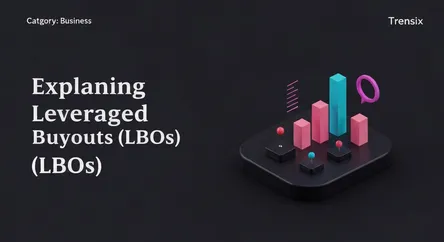Business
Explaining Leveraged Buyouts (LBOs)

Discover Leveraged Buyouts (LBOs), a finance strategy where a company is acquired using significant borrowed funds. Learn why they're trending.
What is it?
A Leveraged Buyout (LBO) is a financial transaction where a company is acquired using a significant amount of borrowed money, or debt, to meet the cost of acquisition. The assets of the company being acquired, along with the assets of the acquiring firm, are often used as collateral for the loans. The acquiring entity, typically a private equity firm, contributes a small portion of its own capital (equity) and uses debt to fund the rest. The goal is to generate substantial returns on the equity investment once the debt is paid down through the acquired company's cash flow or asset sales.
Why is it trending?
LBOs become particularly popular during periods of low interest rates and readily available credit, which makes borrowing cheaper for acquiring firms. Private equity firms currently hold vast amounts of uninvested capital, often called "dry powder," creating pressure to deploy it. As market conditions fluctuate, LBO activity serves as a barometer for economic confidence and merger and acquisition trends. The strategy is also a recurring topic in discussions about maximizing shareholder value and corporate restructuring, keeping it relevant in financial news and strategic business planning.
How does it affect people?
For employees, an LBO can create uncertainty. The high debt load often pressures the new ownership to implement aggressive cost-cutting measures, which can include layoffs and restructuring to increase cash flow for debt repayment. For investors in the private equity fund, a successful LBO can yield impressive returns. However, the high leverage also introduces significant risk; if the acquired company underperforms, it can lead to bankruptcy. Consumers may see changes in the products, services, or pricing of the acquired company as it is streamlined to improve financial performance and efficiency.